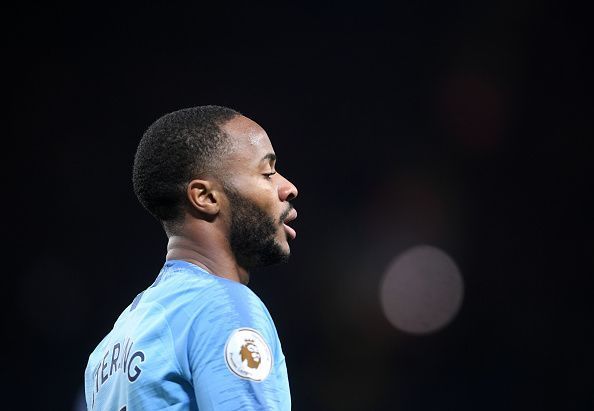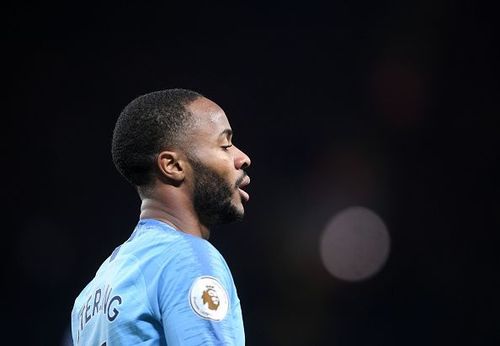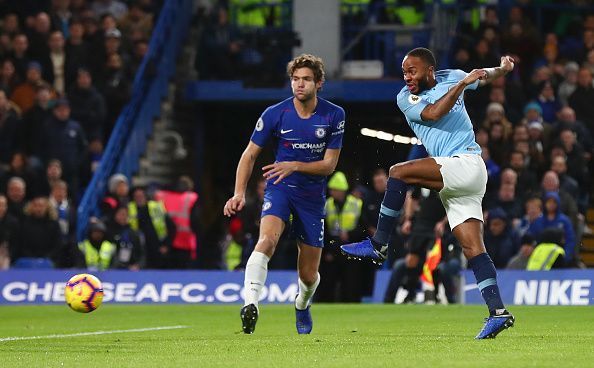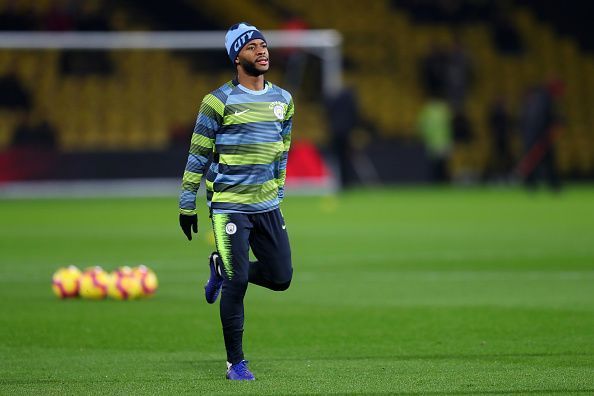
Why Has It Taken Raheem Sterling To Suffer Racial Discrimination Before People In The Media Realised Enough Is Enough?

On Saturday night, Chelsea's scintillating win against Premier League champions Manchester City was overshadowed by an incident of alleged racism from a Chelsea fan as Raheem Sterling was preparing to take a corner close to Stamford Bridge's The Matthew Harding Stand. The video, that went viral after multiple fans spotted it before uploading the footage to Twitter, appears to show one Chelsea fan leaning over the advertising board to call Sterling a 'f*cking black c*unt'.
Sterling responded on Sunday morning via Instagram, in which he blamed the British media's coverage of black footballers for the reason behind the treatment some receive for their lifestyle. The 24-year-old wrote: “You have two young players starting out there careers both play for the same team, both have done the right thing. Which is buy a new house for there mothers who have put in a lot of time and love into helping them get where they are, but look how the newspapers get there message across for the young black player and the young white player. I think this is unacceptable both innocent have not done a thing wrong but just by the way it has been worded. The young black kid is looked at in a bad light. Which helps fuel racism and aggressive behaviour, so for all the newspapers that don’t understand why people are racist in this day and age all I have to say is have a second thought about fair publicity and give all players an equal chance.”
The post was accompanied by pictures of two different Daily Mail articles with one seemingly praising Phil Foden for buying his Mum a £2million home, labelling him as a 'starlet' in the headline 'Manchester City starlet Phil Foden buys new £2m home for his mum'. Whereas the second pictures City youngster, Tosin Adarabioyo, alongside the headline 'Young Manchester City footballer, 20, on £25,000 a week splashes out on mansion on market for £2.25million despite never having started a Premier League match'.
The point Sterling makes is unerring. The need for the additional info in the headline covering the black athlete would only increase the anger of stale, repulsive racists, and those at the MailOnline know that, too. Perhaps those who chose to ignore, and play dumb towards racial undertones are purposely doing so due to their dislike of young black men, but it's more likely that their simple minds can't comprehend that racism is still possible without throwing racial slurs around. The article on Adarabioyo isn't a racial attack on the Manchester-born 21-year-old, however, it's written with the narrative that the defender shouldn't be able to spend his own money without proving himself in the City first-team, despite Foden's playing time also being limited.
The real question here, however, is why did it take for Sterling to be racially abused whilst he was making his living before the country woke up, and stopped ignoring those who had raised the point of a racially-motivated agenda against the City winger before? Now there's an opportunity to look virtuous by backing Sterling, journalists are all calling for action, or lauding Sterling's character, but where were they when their colleagues were targetting him time and time again for living his life and enjoying his football? Now there is a substantial increase in those realising the agenda against Sterling, the media are deciding to change their tone, but still opt-against naming and shaming those continuing the pitiful coverage of young, successful black men.

An example is Neil Ashton, The Sun's Chief Football Reporter who also hosts Sky's Sunday Supplement. The morning after Sterling's racially abused, Ashton says: "Fair play to him [Sterling]. He's got a lot of support from the football community of the back of his post. Not only from football fans, but also from teammates as well, Phil Foden, Patrick van Aanholt, Fabian Delph at City, Demarai Gray. He's got a lot of support in a very short space of time so good on you, Raheem Sterling."
This is from a man who reports for the same newspaper who headlined a front page: 'Tired Raheem at 3 am 3 Lions Party', who tweeted an article with the caption 'From troubled youth to £100,000 a week - The life of footie idiot Raheem Sterling', whose front page in 2016 showed 'England failure steps off plane and insults fans by showing off blinging house' and who published a piece on their website titled 'Love rat Raheem Sterling proposes to long-suffering girlfriend Paige Milian'. I could continue, there are endless articles and headlines on Sterling that have helped contribute to a national dislike of him among bigots and those still not in acceptance that their lives are shitter than a man with a different colour skin. Yet, despite this, Ashton shamelessly acts as though he has nothing to do with the agenda created against Sterling because he knows he would be alone by siding with the abhorrent organisation that is The Sun newspaper.
It's not just Ashton, though. Many journalists are supporting Sterling and whilst not directly contributing to the coverage of him that has helped create a situation such as the one during Chelsea's win over Manchester City, they have a platform they have refused to use when the issue needed to be raised. They have featured on podcasts, radios and football shows. They have had pieces published on websites viewed by many. They have thousands of followers on Twitter. Yet, they only come to Sterling's aid in a time where everyone will agree with them. Where they will be made to look like a noble-knight of journalism, finally discussing the real issues in sport. They opted to support the journalism union and ignore blatantly racially-driven stories because they didn't want to upset a colleague and face them in a press conference, or at a game. And now, they're happy to act as though they've always cared.
Raheem Sterling has become a player that we, as English football fans, would be fantasising about had he made his career in another country. Yet, despite his incredible form for Manchester City and recently for England, he's put down, criticised for having a life away from football and the ability to earn a living that is better than most. Even in praise, he never gets credit. His transformation is solely put down to Guardiola by many, but Guardiola cannot improve a player who has no intentions to want to develop themselves and the Spaniard will probably be the first to tell you that. Sterling has become the player he is because of Guardiola's coaching but also because he listened, worked hard and improved himself, rather than sitting at home, counting his millions and deciding where next to spend it, as some newspapers would have you believe.

What strikes me most about Raheem Sterling is his character. Not only has it taken this long before he spoke out about the treatment he receives, but even when he finally does, his words are not about him. He didn't single out the racist in Stamford Bridge on Saturday night, he didn't ask for people to feel sorry for him or did he confront the issue in a manner deemed as aggravated, his issue was with coverage of team-mate Tosin Adarabioyo and young black players in general. Even in a moment where he could have given a racist the attention he so required, Sterling laughed in his face and continued to focus on his football. What is portrayed of Sterling could not be further from the truth, and it's about time he was allowed to play football without being judged for things other players are not judged on and without having to experience discrimination for enjoying his life.